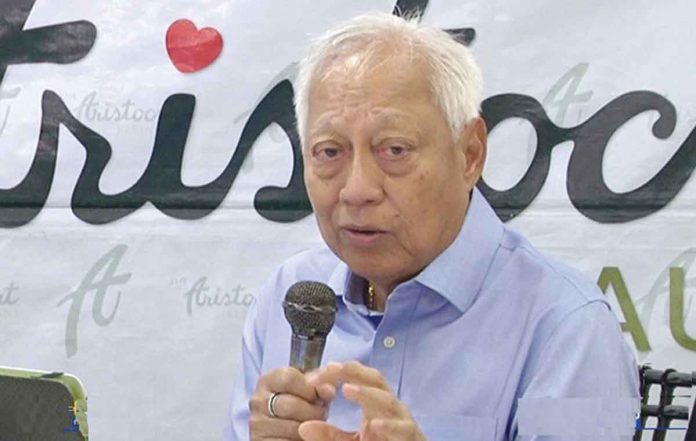
MANILA – Seeking amendments to the 1987 Constitution because of the prevalence of political dynasties is just a “lame excuse” by Congress.
Constitutionalist Christian Monsod asserted this Thursday, as lawmakers at the House of Representatives started its hearings on proposals to amend the country’s main charter.
Instead of tinkering with the 1987 Constitution, Monsod said legislators should instead approve a bill against political dynasties that would extend up to the fourth degree of affinity and which could be implemented in the upcoming barangay election.
A resource person during the hearing of the House committee on constitutional amendments on Thursday, Monsod told congressmen that the “real reason” for attempts to amend the 1987 Constitution could be self-interest.
“Real change cannot happen until we strike at the roots and not at the branches of the problem. Congress has not passed an anti-dynasty law for 35 years, and blames the Constitution for the lapse. That is a lame excuse,” he pointed out.
“The real reason is self-interest, so instead of rushing to amend the Constitution, why don’t our legislators pass an anti-dynasty law, of say four degrees for the barangay elections this year?” he asked.
Monsod, who is one of the framers of the 1987 Constitution, likewise noted that it is ironic to amend the said fundamental law when it is the first Constitution created freely by Filipinos.
According to him, all previous Constitutions of the country were either short-lived, influenced by colonizers, or were done during a dictatorship. He added that the 1986 Edsa People Power Revolution set standards for the 1987 Constitution although these standards are still not achieved up to this day.
“The 1987 Constitution, the seventh in our history, was the first time we spoke to the world as a truly independent and democratic nation — the Biak na Bato and Malolos Constitutions were short-lived interruptions of colonial rule, the others were written under colonial rule, 1935; or under enemy occupation, 1943; or by a dictatorship, 1973; or the transition proclamation while this Constitution was being written in 1986,” Monsod said.
“The inspiration of the 1987 Constitution was Edsa, which wasn’t only about the restoration of democracy through peaceful means — to the poor, it was also the promise of a new social order that remains unfulfilled to this day. We are still the laggards in our part of the world,” he added.
The House committee on constitutional amendments, headed by Cagayan de Oro 2nd District Rep. Rufus Rodriguez, held a hearing on several bills and resolutions seeking to constitute a constitutional convention, and other amendments like changes to term limits of lawmakers and the president and vice president.
There are also proposals to do away with economic provisions that are supposedly restrictive.
But the House’s Makabayan bloc condemned the Cha-cha moves amid an economic crisis. It also said that people should reject any attempt to extend the term of public officials. (Gabriel Pabico Lalu © Philippine Daily Inquirer)






